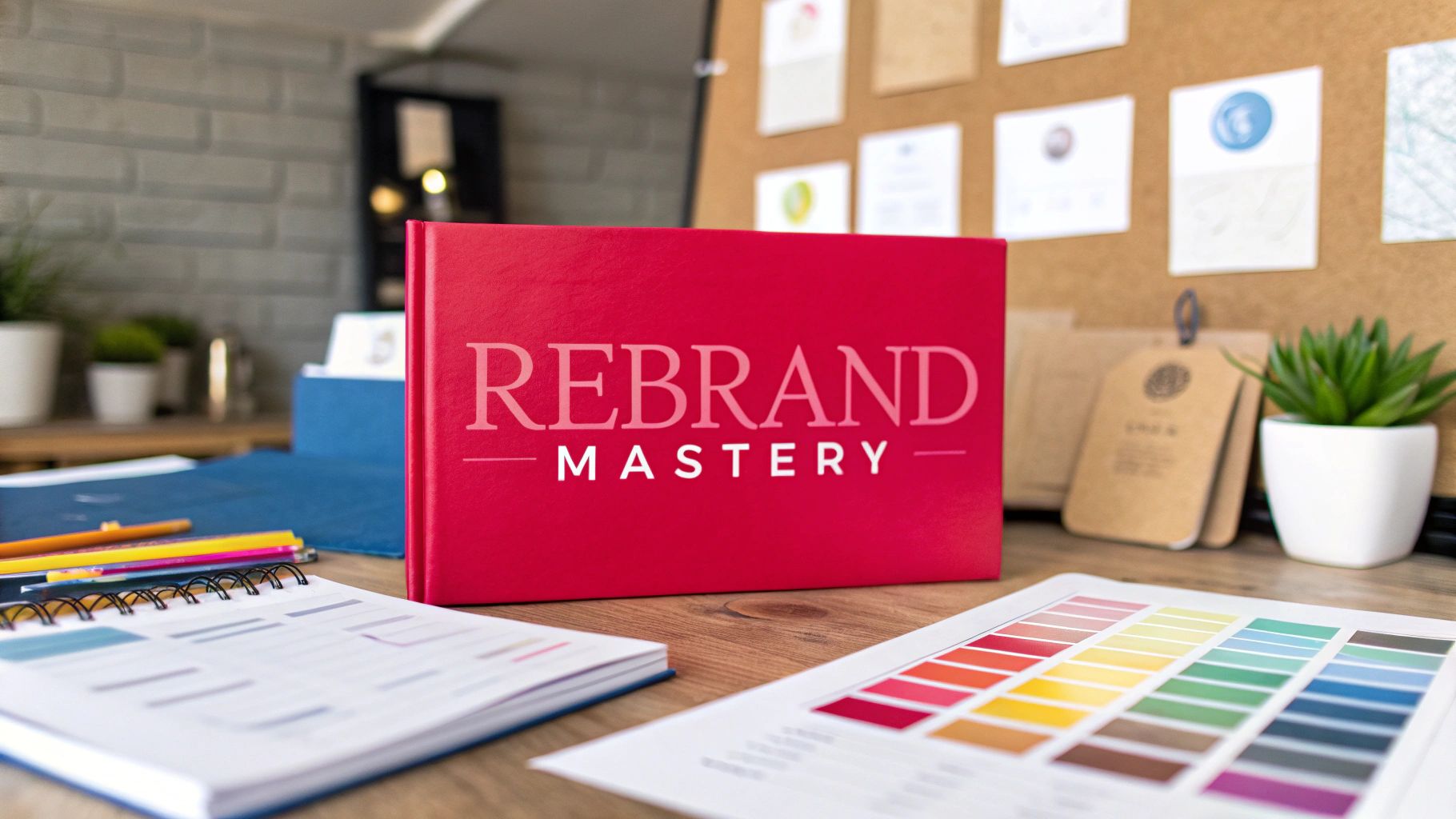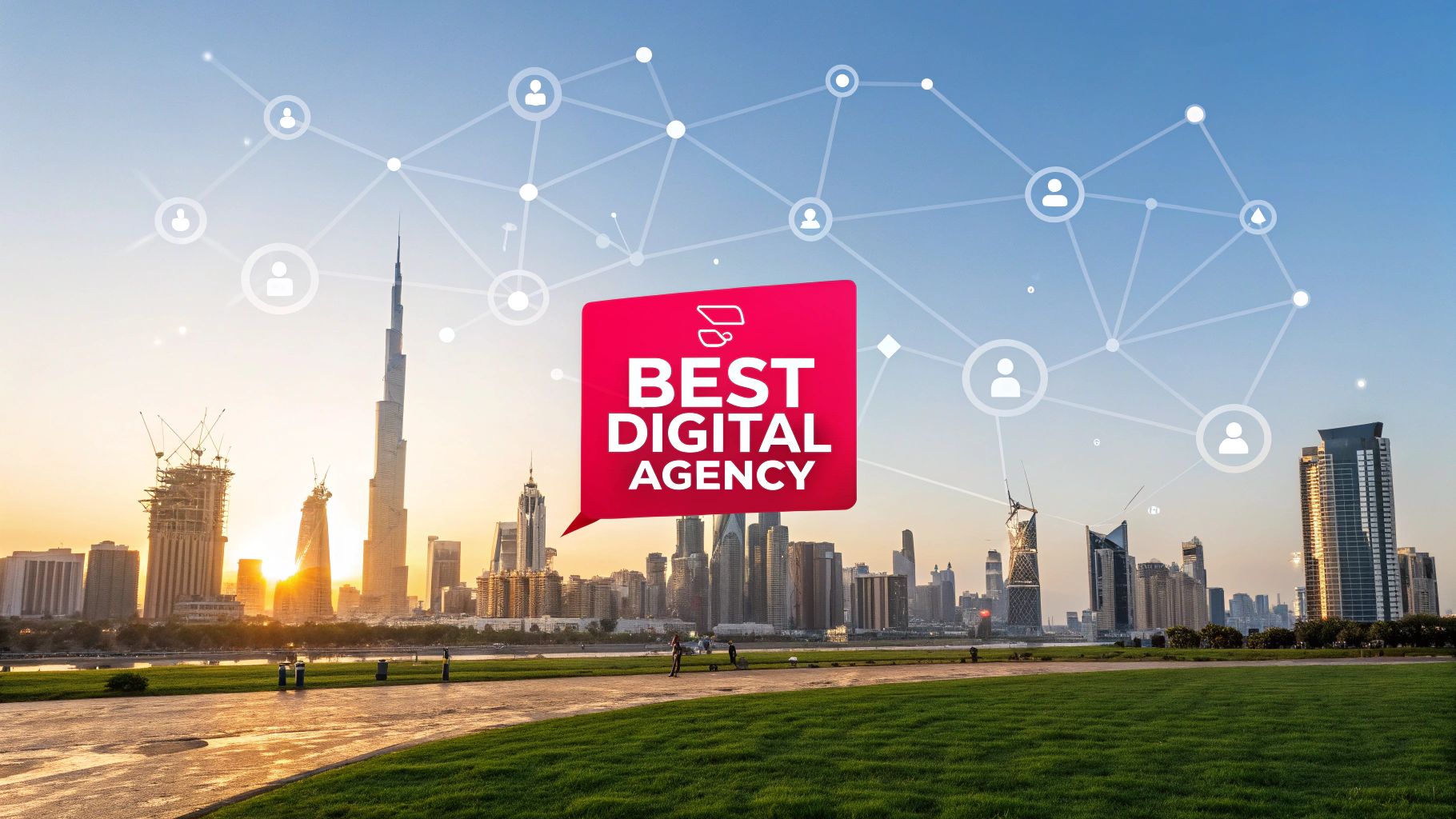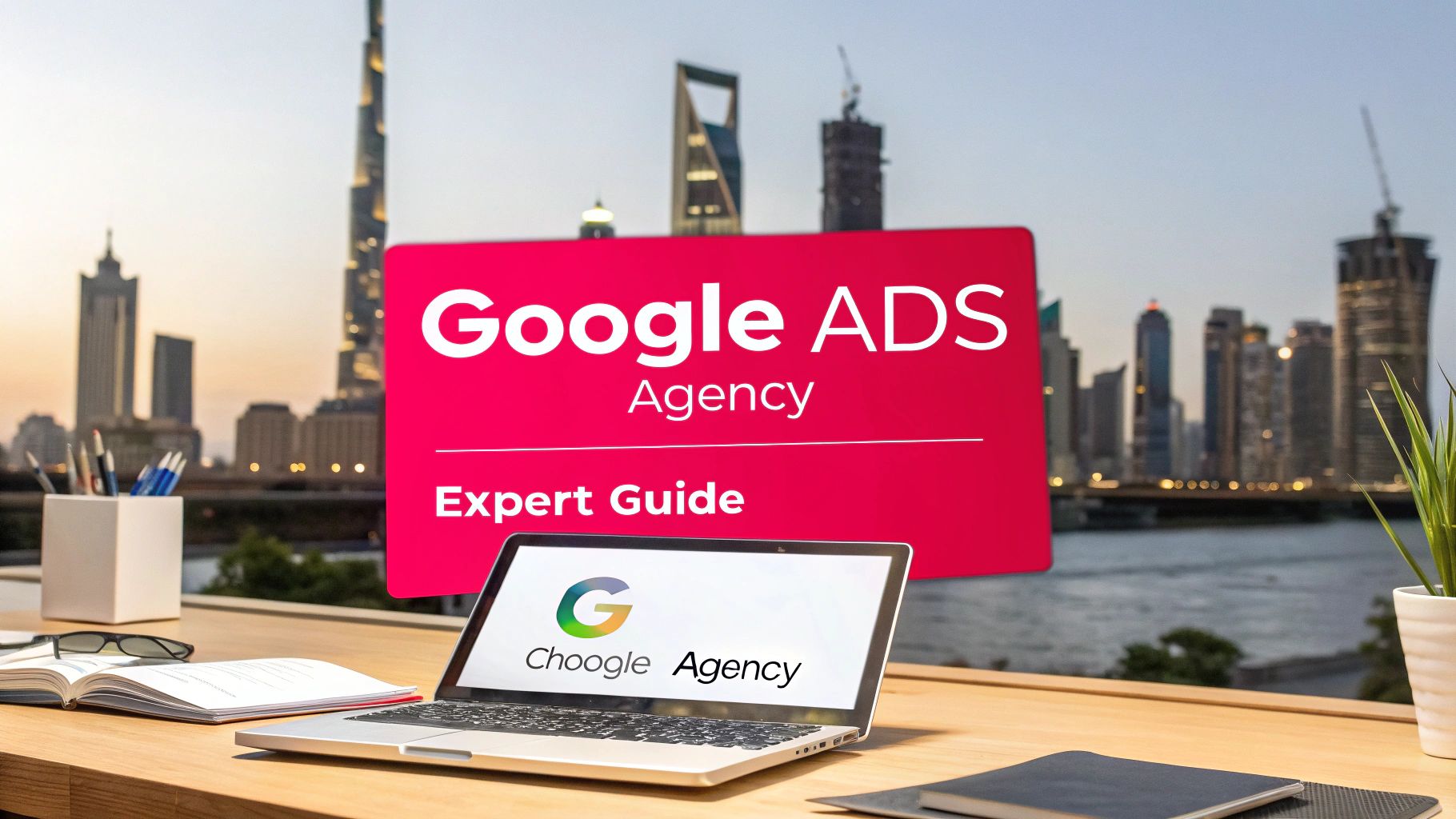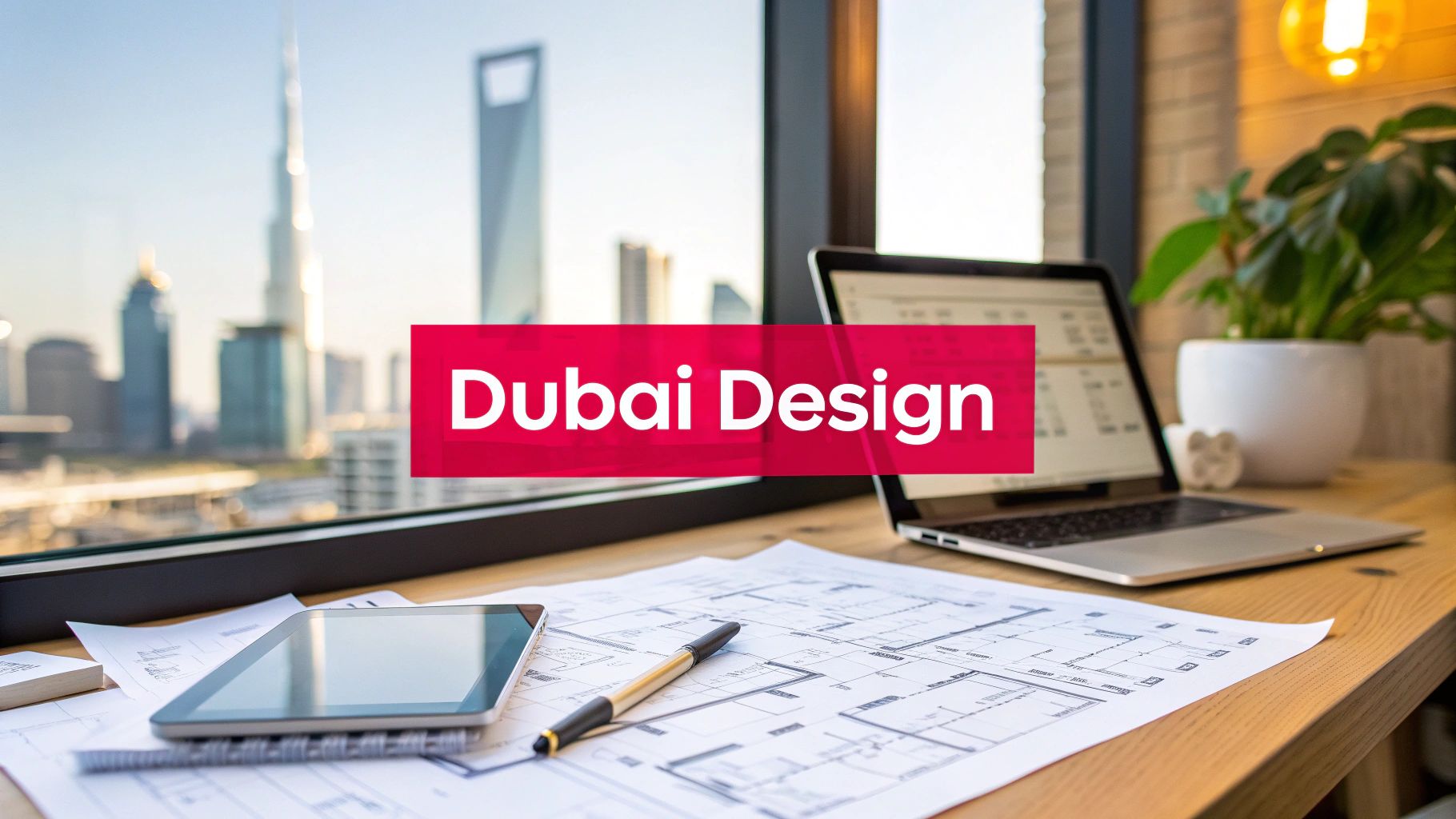Ecommerce in Dubai isn't just growing; it's exploding. This isn't an accident. It's the result of a deliberate fusion of ambitious government vision, sky-high consumer spending power, and infrastructure that’s second to none. For businesses, this represents a golden opportunity in a city that’s quickly becoming the blueprint for digital commerce in the entire region.
Why Dubai Is a Global Ecommerce Powerhouse
So, what’s the secret sauce? What makes Dubai such a magnet for online businesses? It boils down to a potent mix: a strategic global crossroads, massive government investment in all things digital, and a population that loves to shop online. This combination has created the perfect incubator for ecommerce to thrive, pulling in everyone from scrappy startups to global retail giants.
Picture Dubai as more than just a city—it's a high-speed, digital Silk Road connecting East and West. Its world-class ports and airports are the physical arteries, but they're matched by a digital nervous system with near-total internet penetration. This gives businesses the physical and digital highways they need to reach a wealthy, tech-savvy customer base with incredible efficiency.
The Scale of the Opportunity
Let's talk numbers, because they really paint the picture. The UAE's ecommerce market, with Dubai at its heart, was valued at around USD 11.05 billion in the mid-2020s. But it's not stopping there. Projections show it rocketing to USD 20.54 billion by 2030. This isn't a market that's just starting out; it's mature and still has a massive runway for growth.
One of the biggest operational perks? Logistics. Dubai's compact, urban design makes 90% same-day delivery coverage not just possible, but the expected standard. You can dive deeper into the UAE ecommerce market and its future growth to understand the full scope.
To give you a clearer snapshot, here’s a quick look at the key data points and drivers.
Dubai Ecommerce at a Glance
| Metric | Statistic / Detail |
|---|---|
| Market Valuation | USD 11.05 billion (Mid-2020s) |
| Projected Growth | USD 20.54 billion by 2030 |
| Delivery Standard | Over 90% same-day delivery coverage |
| Key Growth Driver | Proactive government support (e.g., Dubai CommerCity) |
| Consumer Profile | High digital literacy and strong spending power |
| Infrastructure | World-class logistics and fulfilment networks |
These figures show a market that is not only large but also built on a solid foundation for sustained success.
Dubai's success story is one of intentional design. The government didn't just aim to build a world-class shopping destination; they set out to create a fully integrated digital economy where doing business online is seamless, secure, and incredibly fast.
Core Pillars of Success
Several key factors are working in tandem to fuel this momentum. Anyone looking to launch or grow an ecommerce business in Dubai needs to understand these foundational pillars.
- Proactive Government Support: The government isn't just a bystander; it's an active partner. Initiatives like Dubai CommerCity, a dedicated free zone for ecommerce, give businesses the turnkey infrastructure and legal frameworks they need to hit the ground running.
- High Digital Literacy: The local population lives online. They are completely at ease with digital payments, online shopping, and discovering new brands through social media, which means you have a ready-made audience waiting.
- Strong Consumer Confidence: A stable economy and high disposable incomes fuel a willingness to spend across the board—from daily necessities to high-end luxury goods.
- World-Class Logistics: The city has poured investment into state-of-the-art warehousing, automated fulfilment centres, and sophisticated last-mile delivery networks. The result? Products get to customers at lightning speed.
When you put all these pieces together, you get an environment where the usual hurdles to starting an online business have been systematically dismantled. It's a market that doesn't just allow ecommerce to exist; it actively encourages it to flourish.
The Engines Driving Dubai's Digital Economy
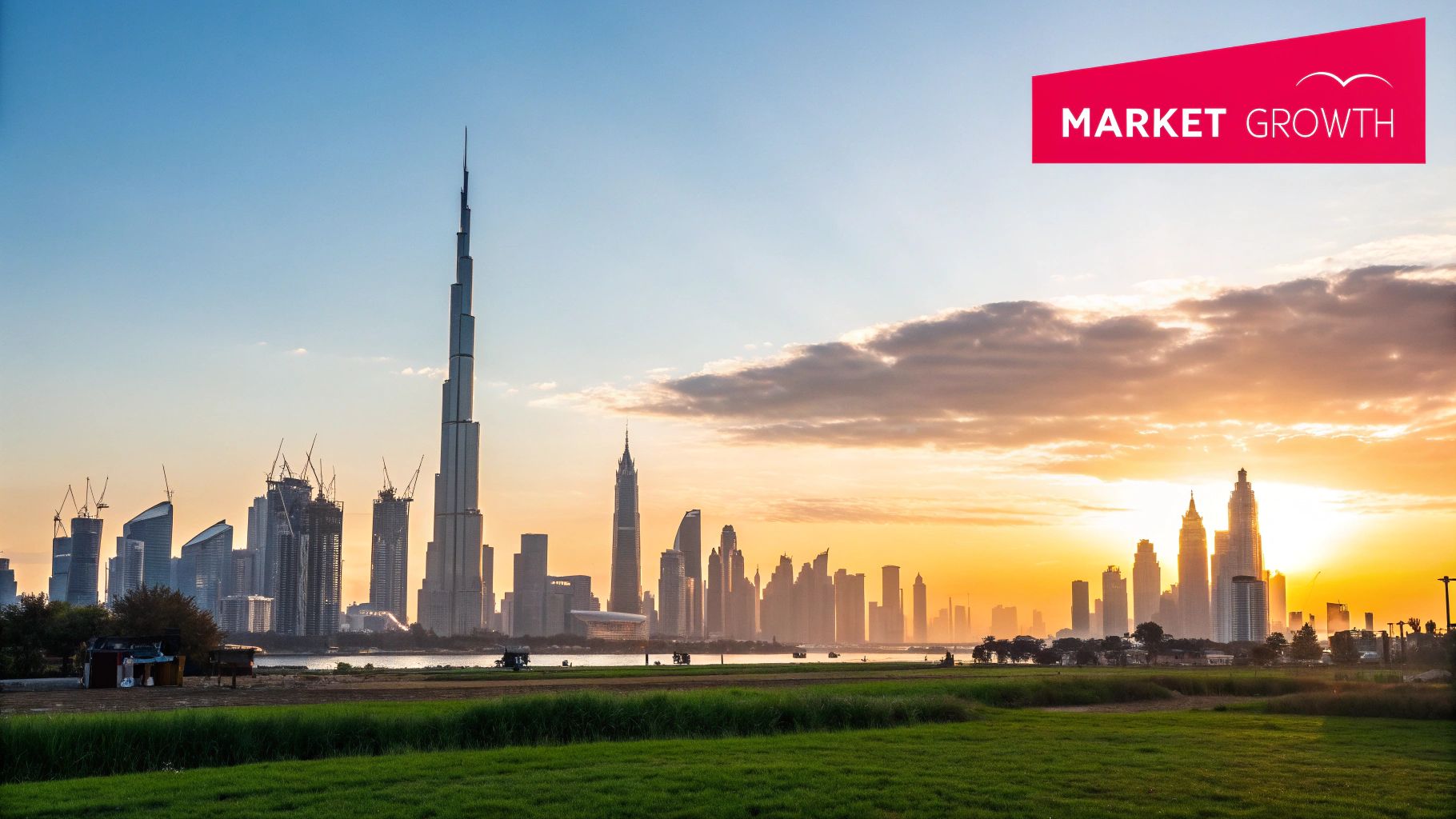
Dubai's phenomenal growth as an e-commerce hub didn't just happen by chance. It's the direct result of a powerful combination of deliberate government strategy, world-class infrastructure, and a uniquely receptive consumer base. Think of these elements as a high-performance engine, all working in concert to propel the digital economy forward at a breakneck pace.
To truly succeed here, you need to understand what makes this market tick. Let’s break down the core drivers.
The government's role has been absolutely pivotal. They've acted less like a regulator and more like a master architect, designing the very framework that allows e-commerce in Dubai to thrive. This isn't just about offering support; it's about actively building entire ecosystems designed to eliminate the usual roadblocks businesses face.
This hands-on approach creates a stable and predictable environment. It gives online businesses the confidence to invest, knowing the foundational support they need is not just available, but is a core part of the city's vision. It’s a huge reason why everyone from local startups to global giants see Dubai as a strategic base of operations.
Visionary Government Initiatives
The government’s vision goes well beyond just creating favourable regulations. They are actively building specialised zones and digital tools that hand online businesses a serious competitive advantage. The goal is simple: make setting up and running an e-commerce operation as smooth as possible.
You can think of these initiatives as pre-built launchpads for digital businesses. Two perfect examples of this are:
- Dubai CommerCity: This isn’t just any free zone; it's the first and leading one in the entire Middle East and North Africa region built exclusively for e-commerce. It offers a complete, integrated solution, bundling logistics, office space, and business setup services into one seamless package.
- UAE Pass: This is the secure national digital identity for citizens and residents, and it's a game-changer for online transactions. UAE Pass lets customers verify their identity and complete purchases with a single, trusted login. This drastically reduces checkout friction and builds a huge amount of consumer trust.
These projects show a real, practical understanding of the challenges online retailers face and deliver direct, powerful solutions.
The government's strategy is clear: remove barriers and create advantages. By building specialised infrastructure and digital identity systems, Dubai has effectively rolled out the red carpet for e-commerce businesses, inviting them to operate with unparalleled efficiency and security.
World-Class Infrastructure and Logistics
An online order is only as good as the physical network that gets it to the customer’s door. Dubai’s infrastructure is a modern marvel of logistics, engineered for speed and total reliability. This physical backbone is what turns the promise of rapid delivery into an everyday reality.
The city's strategic geographic location, paired with state-of-the-art ports, airports, and road networks, forms an incredibly powerful logistics hub. Specialised fulfilment centres and last-mile delivery services are fine-tuned to handle the huge volumes and high expectations of Dubai's shoppers. For a business, this means inventory management becomes simpler and customer satisfaction climbs. Of course, customers have to find you first. That’s why understanding https://grassrootscreativeagency.com/search-engine-optimisation-uae/ is so critical to ensuring your products get in front of this eager market.
A Tech-Savvy and Affluent Population
The final, and perhaps most important, engine is the customer. Dubai is home to a diverse, multinational population with two key traits: high disposable income and exceptional digital literacy. This combination creates an almost perfect consumer profile for any online retailer.
Shoppers in Dubai aren't just comfortable with technology—they expect and embrace it. They are highly active on social media, use digital wallets without a second thought, and are always open to new shopping experiences. This tech-forward attitude applies to everything, from ordering daily groceries to buying luxury fashion online. As the market continues to evolve, it's also worth keeping an eye on new payment technologies. For instance, it’s interesting to see how cryptocurrency is redefining ecommerce transactions and what that could mean for the future.
In the end, it's the synergy of these three forces—proactive governance, superior infrastructure, and an ideal consumer base—that creates such fertile ground for e-commerce. Each element strengthens the others, creating a powerful cycle of growth that continues to cement Dubai’s status as a global leader in digital commerce.
Navigating Your Business Setup and Legal Path
So, you're ready to launch your e-commerce business in Dubai. It can feel like a complex maze at first, but think of it as a well-trodden path with clear signposts. This section is your map, designed to guide you through getting licensed, operating legally, and building a solid foundation from day one. Let's cut through the red tape so you can focus on what really matters: growing your business.
The very first fork in the road is deciding on your business structure. This choice is critical—it dictates everything from your company's ownership and how you can operate to your potential for future growth. It’s the bedrock of your entire venture.
Essentially, you have two main options: a mainland setup or a free zone setup. Each comes with its own set of rules and benefits, and the best fit really hinges on your specific business model and who you plan to sell to.
Mainland Versus Free Zone
A mainland licence is your ticket to trade directly with any customer across the entire UAE, no strings attached. If your main goal is to capture the local market, this is often the most direct route. While it used to require a local Emirati partner, recent reforms have opened the door for 100% foreign ownership in many sectors.
On the other hand, you have free zones. These are special economic areas offering major perks like 100% foreign ownership, tax exemptions, and a much simpler setup process. Dubai has over 40 of them, with some, like Dubai CommerCity, built specifically for e-commerce. Getting a clear picture of the Free Zone vs Mainland Dubai business setup is a crucial first step, as it will define your ownership rights and operational freedom.
The image below gives you a glimpse into the typical flow of an e-commerce transaction here, highlighting the compliance and payment steps you'll encounter.
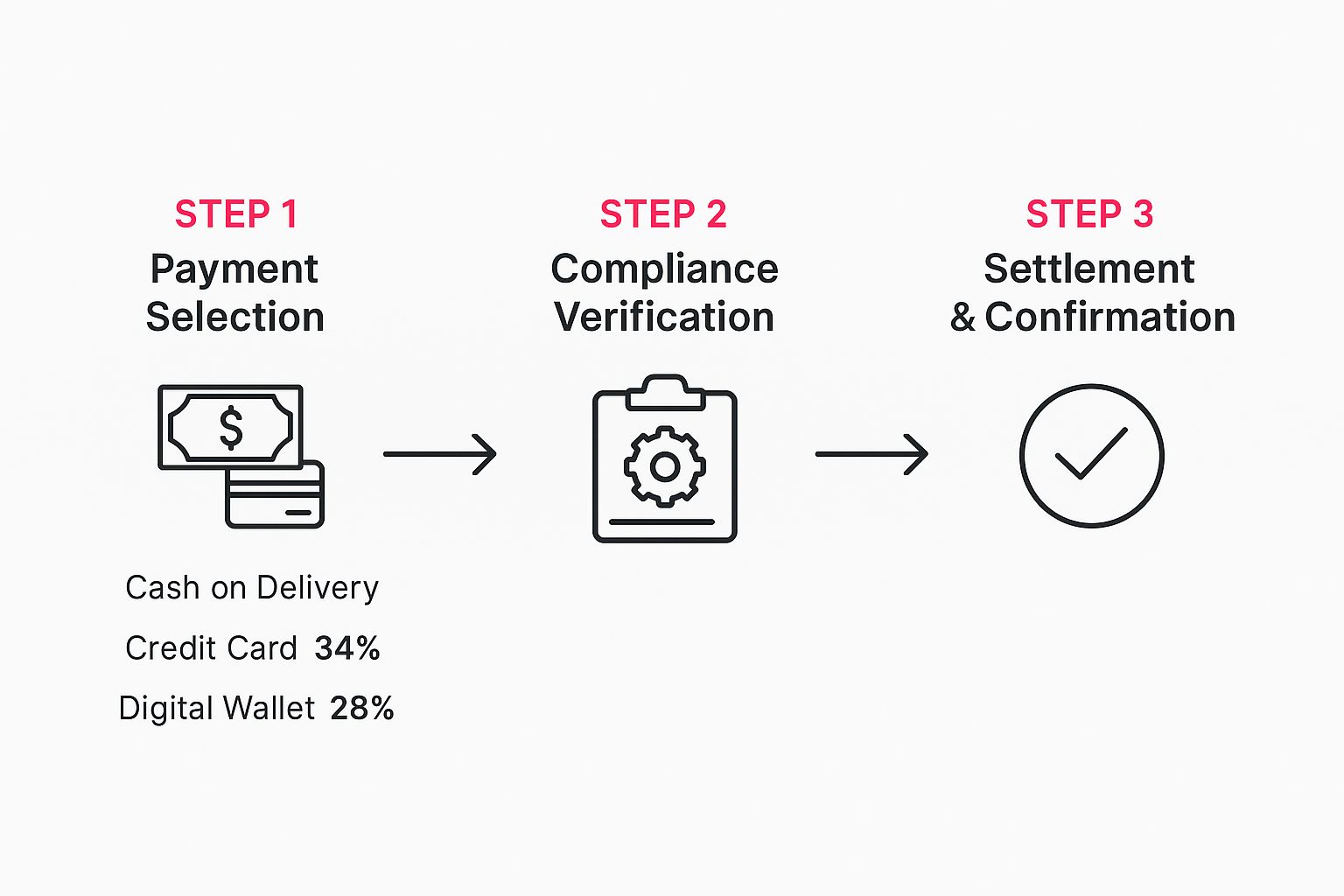
As you can see, even as digital payments become the norm, cash on delivery is still a big player. That means you'll need solid procedures for handling cash, compliance, and settlements.
Securing Your Ecommerce Licence
No matter which path you choose, you'll need an e-commerce licence. This is your official permission slip to sell online, issued either by the Department of Economy and Tourism (DET) for a mainland company or by the specific free zone authority.
The process generally looks something like this:
- Trade Name Reservation: First, you’ll need to pick and register a unique name for your business.
- Initial Approval: Next, you submit your business plan and shareholder info to get a preliminary thumbs-up.
- Memorandum of Association (MoA): This is the legal document that outlines your company’s purpose and structure. It needs to be drafted and officially notarised.
- Office Space: A physical or virtual office address is a must-have requirement for any business setup in Dubai.
- Final Submission: Once all your documents are in order, you submit them to receive your official trade licence.
Following these steps ensures your business is above board and fully compliant with UAE commercial laws. For a deeper look at the technical side of building your online storefront, our guide on https://grassrootscreativeagency.com/ecommerce-website-development-in-dubai/ has you covered.
Understanding Key Regulations
Operating legally in Dubai means playing by the rules, which are there to protect consumers and keep the market fair. You’ll need to get familiar with consumer protection laws—these cover things like returns, refunds, and warranties. Data privacy is another big one, dictating how you’re allowed to collect and manage your customers' information.
It's also worth noting that the government is actively supporting digital growth. The mandatory UAE Pass digital identity, for example, has made it easier and safer for customers to sign up and shop online.
A proactive approach to compliance isn't just about avoiding penalties; it's about building trust. Shoppers in Dubai expect a secure, transparent experience, and a legally sound business is the first step in delivering that promise.
Finally, don’t forget about customs. If you plan to import products, you need to understand the duties and procedures involved. Factoring these costs in from the start is essential for setting the right prices and protecting your profit margins. By tackling these legal steps methodically, you’ll build a resilient business that’s ready to tap into the massive opportunities within the Dubai e-commerce market.
Decoding the Dubai Online Shopper
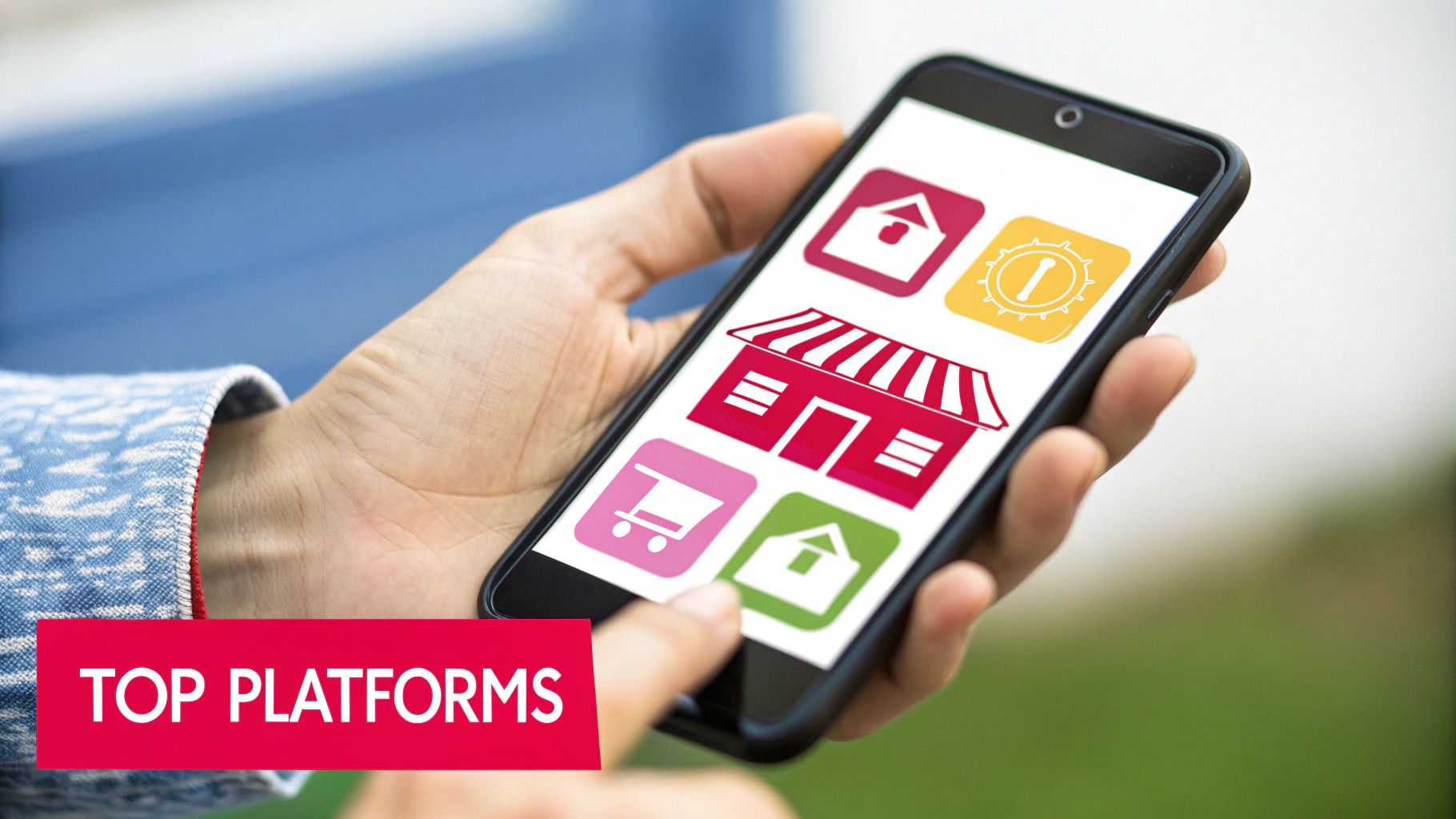
Cracking the code to ecommerce in Dubai comes down to one thing: knowing your customer inside and out. We're not just talking about basic demographics. You have to get into the mindset of the local online shopper to really understand what makes them click "buy," what they truly value, and what sends them running to a competitor.
The Dubai shopper isn't your typical consumer. They're a fascinating mix of global tastes and local traditions, armed with high expectations and serious spending power. This is a digitally savvy, socially connected audience that demands a premium experience from the first click to the final unboxing.
To earn their loyalty, your entire operation—from your product lineup to your marketing messages—has to be finely tuned to their unique motivations.
What Makes Them Buy
The decision-making process for a Dubai online shopper is layered. While a good deal is always welcome, factors like brand perception, trust, and social influence often carry far more weight. They're savvy consumers who actively hunt for quality and authenticity.
Getting a handle on these core drivers is the first step to positioning your brand for success. Here’s what you need to focus on:
- Brand Trust and Reputation: In this market, loyalty is earned. A powerful brand story, crystal-clear policies, and a polished online presence are the foundation of consumer confidence.
- Social Proof and Influencer Culture: What people are saying matters. A lot. Recommendations from friends and endorsements from local influencers are incredibly powerful, making positive reviews and smart influencer partnerships essential.
- A Taste for Luxury and Exclusivity: There’s a huge appetite for high-end, unique products. Limited-edition drops and exclusive collections almost always do well here.
- Convenience Is King: Time is the ultimate luxury. Shoppers expect a completely seamless journey, from intuitive website navigation and one-click payments to ultra-fast delivery.
The Dubai online shopper isn't just buying a product; they're investing in an experience. They expect the digital journey to be as smooth, elegant, and satisfying as a shopping spree in The Dubai Mall.
Top Ecommerce Product Categories in Dubai
Diving into Dubai's e-commerce market requires knowing which product categories truly resonate with consumers. While the landscape is diverse, certain sectors consistently capture the lion's share of online spending, offering a clear roadmap for where to focus your efforts.
| Product Category | Market Share (%) | Key Consumer Trends |
|---|---|---|
| Electronics & Media | 34% | Demand for the latest gadgets, smart home devices, and premium audio-visual equipment. |
| Fashion & Apparel | 31% | Strong interest in luxury brands, modest fashion, and international high-street labels. |
| Food & Personal Care | 15% | Growth in online grocery, organic products, and high-end beauty and cosmetic brands. |
| Furniture & Appliances | 11% | Rise in home improvement, stylish decor, and smart home appliances. |
Understanding the nuances within these top-performing sectors allows you to tailor your inventory and marketing for maximum impact. By aligning with established consumer preferences, you can position your business for stronger, more sustainable growth.
The Unwavering Demand for World-Class Service
If there’s one place you absolutely cannot afford to stumble, it's customer experience. The bar is set incredibly high in Dubai, and failing to clear it is the fastest way to lose business. Customers here are accustomed to five-star service in every part of their lives, and they expect nothing less from online retailers.
Your service model must be built on three non-negotiable pillars:
- Speedy and Reliable Delivery: Same-day or next-day delivery isn't a bonus—it's the standard. Anything less is a major friction point.
- Hassle-Free Returns: A complicated or strict return policy kills trust. Shoppers want a simple, no-fuss process for sending things back.
- Multilingual Support: With a massive expatriate population, offering customer support in both Arabic and English is essential for creating an inclusive and respectful experience.
By understanding these critical traits, you can build an e-commerce strategy that genuinely connects with the Dubai shopper. It's the key to building the trust and loyalty you need to thrive.
Choosing Your Sales Channel in Dubai
Once you've sorted out the legal side of your business, you're faced with a big question: where are you actually going to sell your products? Picking the right sales channel for ecommerce in Dubai is a lot like choosing the perfect spot for a physical shop. It dictates who sees you, how many people see you, and how you operate day-to-day.
You essentially have two main roads you can take. You can either set up shop on an established online marketplace, or you can build your very own direct-to-consumer (DTC) website. Each has its own set of rules and rewards.
Marketplaces give you an instant audience, while your own store gives you total control. The best choice really boils down to your specific business goals, how much you're willing to invest, and what your long-term vision looks like.
The Marketplace Giants: Amazon and Noon
Think of a marketplace as a massive, bustling digital shopping mall. They pull in a staggering amount of traffic, and by setting up your "stall" there, you get to tap right into that constant stream of shoppers. In Dubai, two names tower over the rest: Amazon.ae and the homegrown champion, Noon.com.
When Amazon acquired Souq.com back in 2017, it was a game-changer, bringing a global logistics machine to the local scene. Not long after, Noon.com launched, sparking a healthy rivalry that has been fantastic for both sellers and shoppers. You can learn more about the evolution of Dubai's ecommerce platforms to get a feel for how the market has developed.
A huge perk of these platforms is their fulfilment services, which take the logistical headache off your plate.
- Fulfilment by Amazon (FBA): You ship your inventory to an Amazon fulfilment centre, and they take care of everything else—storage, packing, shipping, and even customer service. It's an incredible way to plug into Amazon's world-class operational network.
- Fulfilment by Noon (FBN): This is Noon's version of the same service, giving sellers access to their massive network of warehouses and delivery teams across the region.
The real magic of marketplaces is baked-in trust. Shoppers already know, use, and trust these brands. For a new seller, that trust transfers to you, making it much easier to land that crucial first sale.
Of course, there's a flip side. This convenience isn't free. You'll pay seller fees and a commission on every sale, you’ll be competing directly with thousands of others on the same page, and you have very little say in how your brand is presented.
The Power of a Direct-to-Consumer Store
The other route is to build your own digital flagship—your own corner of the internet. This is the direct-to-consumer (DTC) model, where you create a branded website using a platform like Shopify, WooCommerce, or Magento. This path is all about control.
With a DTC store, you own the entire customer experience from start to finish. You dictate the look and feel of your site, you craft your brand's story, and—critically—you own your customer data. This direct line to your audience lets you build a real community, run laser-focused marketing, and encourage repeat purchases in a way that's simply not possible on a marketplace.
Making the Right Choice for Your Business
So, which is it? Marketplace or your own store? The truth is, it doesn't have to be an either/or decision. Many of the most successful brands use a savvy hybrid strategy, getting the best of both worlds.
Here's a simple way to think about it:
- For a fast start and quick validation: Begin on a marketplace like Amazon.ae or Noon.com. It's the quickest way to find out if people actually want your product and to start bringing in revenue without a massive upfront marketing budget.
- For building a brand and long-term growth: Launch your own DTC store. This is your foundation for creating a memorable brand, fostering customer loyalty, and ultimately, keeping more of your profits.
- For a powerful hybrid approach: Use marketplaces as a discovery tool. A customer might find your product on Noon, but then head over to your DTC site for a wider selection, a special offer, or just to get a better sense of your brand's personality.
Ultimately, the best strategy for your ecommerce in Dubai journey depends on your resources and your ambition. Whether you choose to open a stall in a giant digital mall or build your own custom boutique, understanding the terrain is the first step to winning.
Building Your Go-to-Market Strategy
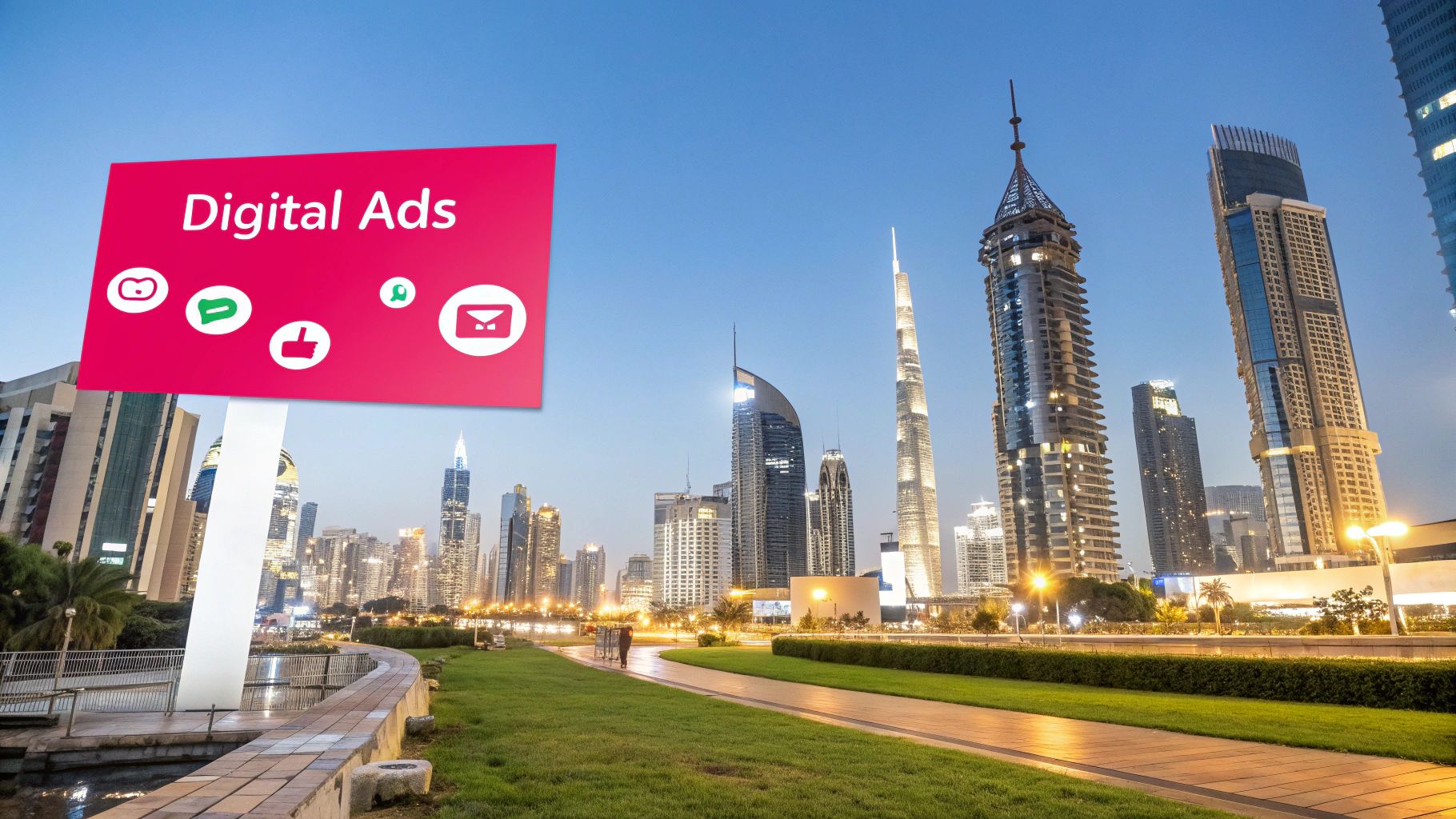
With the legal paperwork sorted and your sales channels picked, it's time to build your game plan. Your go-to-market strategy is essentially your operational blueprint for winning over customers in Dubai's crowded marketplace. It's a blend of smart marketing, sharp logistics, and flexible payment options.
Think of it as the engine powering your store. A fantastic product isn't enough on its own; you need a powerful, well-oiled machine to get that product into the hands of eager customers. This means speaking their language, showing up where they spend their time, and making the entire buying journey feel effortless.
Launching a successful e-commerce in Dubai business means taking a layered approach that caters to what local shoppers truly expect. From culturally-aware content to rapid-fire delivery, every piece of the puzzle has to fit together perfectly.
Digital Marketing That Truly Connects
Your digital marketing is how you'll build your brand and get people to your site. A generic, one-size-fits-all approach simply won't work in Dubai. You have to fine-tune your messaging and be active on the platforms your ideal customers actually use.
A solid ecommerce content strategy that clicks with local tastes is the foundation. And we're talking about more than just a quick translation.
- Localised Arabic Content: This is non-negotiable. Creating high-quality, culturally sensitive content in Arabic shows respect and makes your brand feel genuine and accessible.
- Influencer Marketing: Don't underestimate the power of influencers on Instagram and TikTok in the UAE. The right partnership can give you instant credibility and put you in front of a massive, engaged audience.
- Social Commerce: Social media use here is through the roof. Letting people buy directly from your posts on Instagram and Facebook is crucial for catching those impulse purchases.
Mastering Logistics and Last-Mile Delivery
In Dubai, fast delivery isn't a bonus—it's the bare minimum. A slow or unreliable delivery service is a surefire way to lose customers and never get them back. Getting your logistics right is absolutely critical to your survival.
Many new businesses team up with third-party logistics (3PL) providers to handle the heavy lifting. These partners can manage warehousing, inventory, and the whole pick-pack-ship process, especially that all-important final delivery to the customer’s door. This lets you concentrate on what you do best: marketing and growing your sales.
Solving the last-mile delivery puzzle is a major competitive advantage. Whether you use a 3PL or build your own network, the goal is the same: get the product to the customer quickly, reliably, and with excellent communication throughout the process.
Navigating the Payment Landscape
Finally, you have to make it incredibly easy for people to pay you. While digital wallets and credit cards are gaining ground fast, you simply can't ignore the strong preference for Cash on Delivery (COD).
Offering COD is really about building trust. A lot of shoppers still want to physically see the product before parting with their money. It definitely adds a layer of complexity to your operations, but not offering it means you could be shutting the door on a huge chunk of potential buyers.
- Offer Multiple Options: Give your customers choices. Make sure you accept credit/debit cards, popular digital wallets, and, of course, COD.
- Incentivise Digital Payments: You can gently nudge customers toward paying online. Try offering a small discount or free shipping for prepaid orders to slowly reduce your dependence on cash.
By weaving together a solid strategy that covers marketing, logistics, and payments, you'll build a tough, successful e-commerce business that's ready to flourish in Dubai’s exciting market.
Got Questions About Dubai Ecommerce? We’ve Got Answers.
Jumping into Dubai's ecommerce scene can feel a bit daunting, and it's natural to have a few questions. Let's tackle some of the most common ones that pop up for entrepreneurs looking to get started.
What's the Real Cost to Launch an Online Store in Dubai?
This is the big one, and the honest answer is: it depends. The biggest variable is your business licence. If you go the popular free zone route, you're looking at an annual cost somewhere between AED 10,000 and AED 50,000. Setting up on the mainland can require a bigger upfront investment.
But the licence is just the starting line. You also need to factor in the real-world costs of running the business:
- Your ecommerce platform fees (think a monthly Shopify subscription).
- The initial cost to buy your inventory.
- Your budget for digital marketing to actually get seen.
- Fees for setting up your payment gateway.
You could get a lean, bootstrapped store off the ground for under AED 30,000, but if you're serious about growth, it's wise to budget more to cover unexpected bumps in the road.
Do I Really Need a Local Emirati Partner?
This is a very common myth, and for most ecommerce businesses, the answer is no. If you set up shop in one of Dubai's many free zones, you can maintain 100% foreign ownership. This is the path most international entrepreneurs take for a reason—it's straightforward and gives you full control.
The need for a local partner or agent usually only comes into play if you opt for a mainland licence. That structure gives you total freedom to trade anywhere in the UAE, but a free zone setup offers more than enough flexibility for the vast majority of online stores.
Which Products Actually Sell Well in Dubai?
The Dubai market definitely has its favourites. We consistently see strong performance in a few key areas:
- Consumer Electronics: There's an insatiable appetite for the latest phones, laptops, and gadgets.
- Fashion and Apparel: From high-end luxury labels to everyday fast fashion, clothing and accessories are huge.
- Beauty and Personal Care: Premium cosmetics, niche fragrances, and high-quality skincare are always in demand.
- Luxury Goods: Think watches, jewellery, and designer handbags. Exclusive items do incredibly well here.
A quick word of advice: while these categories are hot, the real magic is in finding your niche. Don't just sell "fashion"—sell sustainable kids' wear or vintage-inspired accessories. Dig into the trends to find a gap you can own.
How Do I Sort Out Shipping and Returns Without a Headache?
Logistics can make or break an ecommerce business. Don't try to do it all yourself. The smart move is to partner with a third-party logistics (3PL) provider that lives and breathes ecommerce. Companies like Aramex, Fetchr, and Shipa have this down to a science.
They'll handle everything from storing your products in a warehouse to picking, packing, and last-mile delivery. More importantly, they manage the entire returns process. A smooth, easy return policy isn't just a nice-to-have in Dubai; it's essential for building the customer trust you need to thrive.
Ready to build a powerful brand and carve out your space in Dubai's digital marketplace? At Grassroots Creative Agency, we create data-supported, content-driven strategies that get real results. Let's tell your story and grow your business together.


